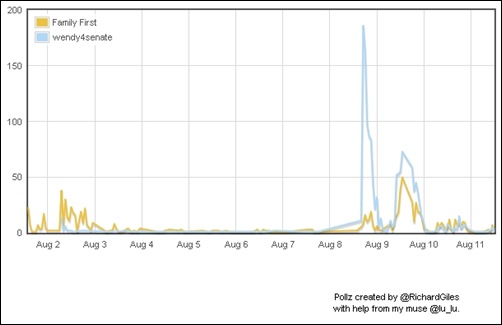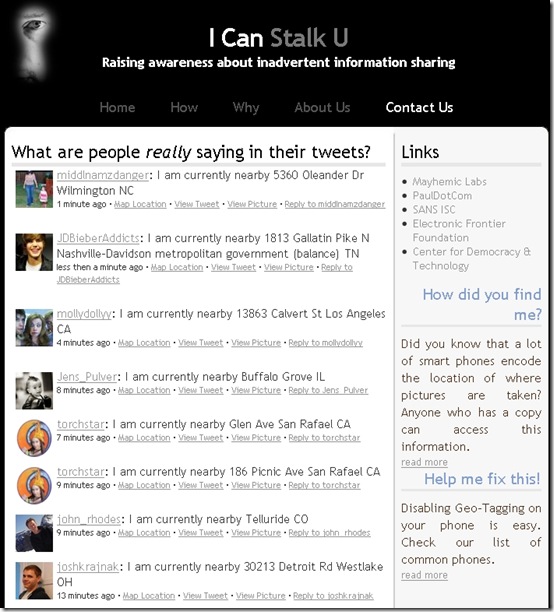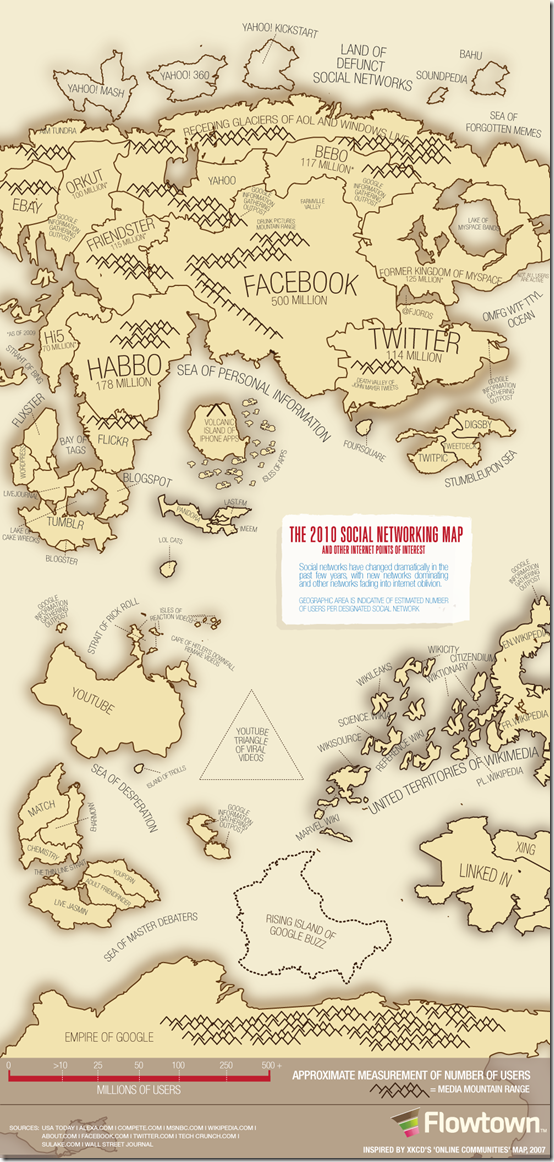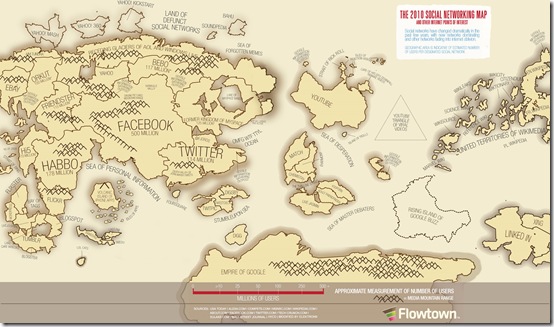Home » social media (Page 22)
Category Archives: social media
Initial Thoughts on Facebook Places
 Earlier today Facebook announced the release of their long-rumoured geographic tagging tool, Facebook Places. In a nutshell, Places will allow smartphone-wielding users to ‘check in’ at whatever notable location they happen to be, and share that information with friends on Facebook (who, as per your privacy settings, will either be a very small group or all 500 million+ Facebook users). The history of whose checked in where will become part of the Facebook record for that place, and thus any tagged comments people make in or about those places will become part of, effectively, place history.
Earlier today Facebook announced the release of their long-rumoured geographic tagging tool, Facebook Places. In a nutshell, Places will allow smartphone-wielding users to ‘check in’ at whatever notable location they happen to be, and share that information with friends on Facebook (who, as per your privacy settings, will either be a very small group or all 500 million+ Facebook users). The history of whose checked in where will become part of the Facebook record for that place, and thus any tagged comments people make in or about those places will become part of, effectively, place history.
While similar check-in services like Foursquare already exist, the huge number of Facebook users means that this has the potential to bring place-based social sharing even further into the mainstream. Indeed, at the Places launch, Facebook has already announced partnerships with many place-based services, including Foursquare, Gowalla and Yelp; check-ins on those services can also become check-ins on Facebook Places in the near future.
Facebook’s unique selling point, of course, will be capitalising on the existing social networks people have established. Facebook Places will actually allow people to tag friends, much in the way you can currently tag friends in photos. One iPhone user will be able to tag the all of their relevant Facebook friends as they check-in somewhere. While this is certainly very social, it’s also a huge boon to business and advertisers, and raises a whole new raft of privacy concerns.
For businesses, especially small businesses, Facebook Places has enormous potential. Localised reviews and ratings have been popping up all over the web for years, but the reach of Facebook, and the ease of access, will make social commentary of restaurants, clubs and other businesses easily aggregateable and accessible. Facebook have already indicated that Facebook business pages will be able to integrate the related Facebook Place information. While Facebook themselves aren’t immediately releasing game-based tools with Facebook Places, canny businesses will surely take up this data to reward/encourage customers – as the have with Foursquare – ‘10 Facebook Place check-ins and get a free muffin’ will be with us soon. Of course, an inevitable legal battle is also just around the corner: which will be the first business to sue a Facebook user for a negative comment about that place? The divide between expressing an opinion, and effectively reviewing a location, will certainly blur even further.
With all of this new information sharing come massive privacy questions, and questions which in typically Facebook style they’ve deferred to an opt-out mentality: users will be able to chose, using one of those elusive privacy settings, to either disable other people checking them into places, or they can remove check-ins manually, similar to the way folks can un-tag themselves in unflattering photos. By default, though, it seems everything will be turned on, and users will have to actively seek to disable Facebook Places if they don’t wish Facebook to build a history of where you’ve been. It’s worth noting that the New York Times, The Guardian and Mashable all have articles up citing privacy concerns about Facebook Places, before the service is even a day old. It’ll be interesting to see what problems Facebook encounters with Places, but they’ll no doubt do as they always have: turn it on, let everyone try it out, then slowly deal with whatever complaints and protests arise, knowing full well that 99% of users will never leave Facebook for fear of giving up vital social capital.
Initially, Facebook Places is only available in the US (and thus the official Facebook Places page will show you nothing in Australia today) but it’s sure to land here in the near future. Oh, and no use trying to set you privacy in advance: I’ve checked, and I can’t find a way to pre-emptively disable other people checking me in; I guess I’ll have to remember to do that once the service is activated down under. Update: It’s now possible to opt-out and disable other people checking you in, no matter what country you’re in. If you want to disable other people’s ability to add you to their check-in entirely, then follow these instructions from Valleywag.
Update: While it’s pretty clear that Facebook Places is yet another tool to entice advertisers to Facebook, often seen in direct competition with Google, in a move that really highlights Facebook’s desire to challenge Google, the maps used by Facebook Places will be exclusively powered by Microsoft’s Bing Maps.
Update 2: Facebook Places went live in Australia on 30 September, and it took only hours for the first privacy concerns to arise.
Digital Culture Links: August 16th 2010
Links for August 12th 2010 through August 16th 2010:
- Cultural Studies – Crafting Fictional Personas With the Language of Facebook [NYTimes.com] – Interesting if very judgmental piece which is ostensibly looking at a fictional Facebook profile as part of a fiction narrative, then suggests that all Facebook profiles are fiction: “…a brilliant stroke to use Facebook for novel writing, because in general Facebook feeds on fiction; it consumes it, and spits it out in every direction. Being “friends” on Facebook is more of a fantasy or imitation or shadow of friendship than the traditional real thing. Friendship on Facebook bears about the same relation to friendship in life, as being run over by a car in a cartoon resembles being run over by a car in life. Facebook is friendship minus the one on one conversation, minus the moment alone at a party in a corner with someone (note to ninth graders: chat and messages don’t count); Facebook is the chatter of a big party, the performance of public cleverness, the facades and fronts and personas carefully crafted, the one honed line, the esprit de l’escalier; in short, the edited version.”
- When to use i.e. in a sentence [The Oatmeal] – Want to know when to use ‘i.e.’ or ‘e.g.’ properly – the Oatmeal has funny words with pictures to clarify these confusing issues. 🙂
- NBN crucial to health of economy: expert [WA Today] – My colleague Matthew Allen talks about the importance of the NBN for future development in Australia: “Australia’s economy would suffer if work to improve internet speed and availability isn’t immediately started, according to a Curtin University internet expert. Internet studies Professor Matthew Allen said Labor’s national broadband network may take longer to roll-out and cost more than the Coalition’s plan but it would be of greater benefit in the long run. The government yesterday announced its $43 billion national broadband network would be upgraded to provide speeds of up to one gigabyte per second, making it 10 times faster than was originally touted.”
- Pushing Our (Tweet) Button [Twitter Blog] – Twitter releases its official ‘tweet this’ button, which can be included on any website with just a few lines or code. It’s fairly similar in style to Facebook’s ‘Like’ button, but obviously performs a slightly different function. I quite like the option to include a counter showing how many times a post has been retweeted already – the counter seems to include retweets using most popular url shortening services!
- Whiteboard girl hoax fools thousands on net [BBC News] – Shocking almost no one, it turns out that the hugely popular net sensation ‘Jenny’, who quit her job using a series of messages on whiteboards, is a hoax, orchestrated by thechive.com. The model’s name is Elyse Porterfield and today she and thechive.com admitted the hoax.
I Can Stalk U
I Can Stalk U is another one of those very simple websites which highlights how information already being shared by people everyday may be used in ways we’ve not necessarily thought through. In a similar vein to Please Rob Me, which highlighted tweets where people indicated they were leaving their home, I Can Stalk U illustrates how much information many people are inadvertently sharing via the geographic photo tagging in many smartphones (including iPhones). On the I Can Stalk U website, each tweet that includes geotagged photos is translated (ie the metadata is read, and presented), showing the approximate address, this address on a Google Map, the picture it was attached to, and a link to the original tweet. All of this information is publicly accessible, the website is simply putting the geotag information up front, rather than the original tweet. Here’s an screenshot from the website:
Often these sort of websites can be a bit confronting for people who’ve not thought about their privacy in relation to geotagged photos. The whole concept of metadata – literally, ‘data about data’ – which can so easily be embedded in photos, is a bit disconcerting for many people who may not have realised it was there. Thankfully, despite the initially confronting website, I Can Stalk U is set up as an educational tool, showing what data is unknowingly being shared, and telling you how to fix that if you don’t want this information out there on the web. On their ‘How’ page, the I Can Stalk U folks provide details on how to disable geotagging for iPhones, Blackberries and some other popular smartphones. If you’ve got one and it’s not on the list, it’s worth disabling the geotagging unless you’re 100% comfortable with every photo you take (and share) embedding the where, when and on what that photo was taken.
Digital Culture Links: August 10th 2010
Links for August 4th 2010 through August 10th 2010:
- Women Set the Pace as Online Gamers [NYTimes.com] – “Although women are still slightly in the minority among global Web users, they are closing ground with men and, once connected, spend about two more hours online a month on average. […] Women also outpace men in photo sharing and shopping, and in what may come as a surprise, gaming, favoring casual puzzle, card and board games. Female gamers over 55 spend the most time online gaming of any demographic by far and are nearly as common as the most represented group, males 15 to 24.”
- Wikipedia’s Lamest Edit Wars [Information is Beautiful] – Fantastic infographic showing a timeline of some of Wikipedia’s silliest editing wars.
- Omo GPS stunt opens doors for marketers [News.com.au] – Unilever Brazil has embedded 60 GPS trackers in OMO washing liquid bottles and then their teams have followed the pruchasers of these bottles home and given them prizes. Understandably, many privacy issues have been raised!
- Does Facebook unite us or divide us? [CNN.com] – Brilliant, and a little confronting, TED talk from Ethan Zuckerman (senior researcher at Harvard University’s Berkman Center for Internet and Society) looking at how globalisation might be a technical achievement, but not a social or mediated one (“cosmopolitan globalisation”). We look to our own social networks, and they increasingly narrow our perspective rather than broadening it.
- Update on Google Wave [Official Google Blog] – Google Wove: Wave development ceases, after users find it’s all too complicated.
- CommBank app lets people snoop on your house [SMH] – House-pricing information is apparently available to the public generally, but there is a real sense of privacy invasion at work here: “There’s a brand new property app on the block that gives iPhone users detailed information on the value of any house they care to point their handset towards, but privacy experts warn it may not sit well with the neighbourhood watch. Detailing sales prices of 95 per cent of Australian homes, the free app has been launched by the Commonwealth Bank in a bid to deliver more immediate buying and selling information to the public as they are actually viewing properties, helping them to ward off rogue sellers who attempt to talk up property prices. Just by pointing an iPhone at a particular property, they will be able to see the last sale price of the property, and if the home is actually for sale, the app will bring up a listing from realestate.com.au with details such as home layout and pictures.”
- Thunderous Bolt sensitive to parody [ABC The Drum Unleashed] – Jason Wilson weighs in on fake Twitter profiles in the wake of Andrew Bolt’s angry denouncement of (fake) himself: “Online fakery is something that draws on different strands in online and offline cultural history. Apart from drawing on early online examples like Fake Steve Jobs, Twitter faking has links with political impersonation, writing techniques like pastiche, and it also has some relationship to genres like fan fiction. After all, the best fakes don’t just go after their targets with blunt instruments, they create a narrative world for the fake persona to inhabit …”
2010 Social Networking Map
A great 2010 update from Flowtown’s Ethan Bloch of the (in)famous XKCD Map of Online Communities.
Update: Or you might prefer your map horizontally …
Wendy NOT 4 Senate
So, in an electioneering Australia political landscape most notable for not being notable, it’s the bigots and racists that seem to stand out, and that seems to be the home territory for Family First senatorial wannabe Wendy Franics who, yesterday on Twitter suggested allowing gay couples to be parents was tantamount to child abuse. The rapid, wide-spread dismay and denouncement of her tweets seems to have shaken Francis, who deleted her tweets, only to discover that people take screenshots of stupid stuff other people say online. Indeed, responses to Francis’ bigotry have become a hot-topic on the #ausvotes hashtag, proving that in an election it’s certainly not true that all publicity is good publicity! In a follow-up interview, Francis has been unable to justify deleting her offensive tweets, but has rather gone on to dig an even deeper hole for herself. Meanwhile, the inevitable parody Fake Wendy Francis tweet account – Wendy2TheSenate – is already making the most of Family First’s predicament (it’s a lot more fun to read than her real Twitter account). It’s also interesting to note how effectively Twitter Lists can be used to protest about someone’s bigotry (screen capture; oh, and that picture/link contains some naughty words!).
As this graph shows, within the #ausvotes tweets on Twitter,Francis’ gaffe certainly got attention, more attention even than her party en masse, but that’s not the attention most politicians are after on the way to an election:

[Graph generated by Pollz.]



